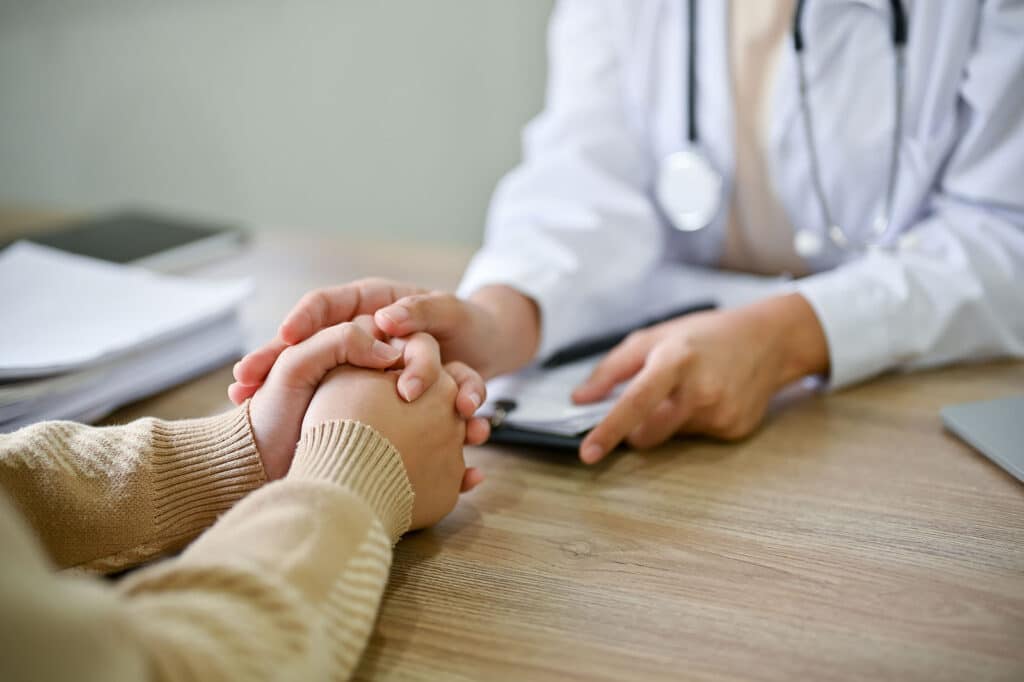Medication-assisted treatment (MAT) is a holistic approach to overcoming substance use disorders and treatment of opioid use disorder. It uses FDA-approved (U.S. Food and Drug Administration) medication and behavioral therapy to reduce the intensity of symptoms and cravings associated with opiate or alcohol withdrawal. MAT medications help reduce the risk of relapse and life-threatening opioid overdoses, giving patients a better chance of survival. They help the brain function normally so that patients can pursue success in recovery, avoid criminal activity, stay employed, and experience better birth outcomes when they are pregnant. When combined with behavioral therapy, patients learn to avoid using substances, acquire healthier coping skills, build support systems, and understand their addiction so that they can achieve long-term sobriety.
Table of Contents
- 1 The Science Behind MAT: How Opioids and Alcohol Impact Brain Chemistry
- 2 Why use Medication to Aid in Addiction Recovery?
- 3 Key Benefits Of Medication-Assisted Treatment
- 4 Common Medications Used in Medication-Assisted Treatment
- 5 Integrating MAT with Behavioral Therapies
- 6 Criticisms and Misconceptions about Medication-Assisted Treatment
- 7 The Impact of MAT on Recovery
- 8 How to access MAT and what to consider
- 9 MAT can help you safely Overcome Addiction and optimize your Recovery
- 10 RESOURCES AND FURTHER READING
The Science Behind MAT: How Opioids and Alcohol Impact Brain Chemistry

Opioids
Opioids flood the brain’s pleasure receptors with dopamine, which can cause euphoria and quickly lead to psychological addiction. Over time, as the brain builds up a tolerance to opioids, more drugs are needed to achieve the same high. Eventually, the brain loses its ability to function normally without opioids, and physiological addiction sets in. Opioid dependence changes the structure of the brain, so addicts are unable to stop using drugs, even when the consequences are extremely negative. Long-term opioid use can have many harmful effects, including poor behavioral regulation, impaired social, emotional, and cognitive function, flawed reasoning, planning, problem-solving skills, and decision-making skills.
Alcohol
Alcohol use releases dopamine and serotonin, a neurotransmitter that creates feelings of happiness and calm. It also increases the effects of GABA, a neurotransmitter that slows brain response, which can lead to loss of inhibition and slurred speech. Long-term alcohol use can result in neuron death and atrophy of the brain, which can cause memory impairment, neuropathy, and ataxia.
Overcoming an addiction involves stopping and reversing the damage to the brain’s endorphin receptors, which is critical to preventing brain damage. Early intervention for a substance use disorder typically leads to easier and more lasting sobriety.
Why use Medication to Aid in Addiction Recovery?
Medication can mitigate the physical symptoms of addiction as substance users move toward recovery. It can treat specific symptoms experienced during detoxification, prevent cravings, or counteract a high. A variety of prescription medications can be used for opioid treatment programs. While each medication works differently, they are all designed to help regulate brain chemistry and diminish opioid withdrawal symptoms, like delirium tremens, that can lead to illness, heart failure, relapse, and other harmful outcomes.
Key Benefits Of Medication-Assisted Treatment
MAT medications can either target and treat precise detox symptoms or reduce physical discomfort and prevent cravings for drugs. MAT normalizes brain function by engaging the opioid receptors that have been altered by addiction. When the medication blocks the effects of opioids, it blunts withdrawal symptoms while stabilizing brain chemistry. Some medications block the euphoric effects of opioids or the feelings associated with alcohol and help restore equilibrium to support recovery. The treatments can reduce anxiety and depression, make it easier to maintain sobriety and reduce the possibility of overdosing. MAT demonstrably improves outcomes in addiction treatment by reducing opioid or alcohol use, supporting long-term recovery, and improving quality of life.
Common Medications Used in Medication-Assisted Treatment

Methadone
Methadone is a controlled medication that reduces withdrawal symptoms and cravings for opiates by blunting or blocking their effects. It is known as a long-acting, complete opioid agonist, which means that it interacts with and maximizes the responses from opioid receptors. This medicine is generally safe and effective when taken as prescribed, but it can have side effects, including nausea, vomiting, loss of appetite, headache, dry mouth, sweating, mood swings, insomnia, and reduced sexual drive. Serious side effects can include labored or shallow breathing, chest pain, accelerated heartbeat, lightheadedness, itching, hives, rash, swelling, hallucinations, confusion, drowsiness, and seizures. Anyone who experiences these more dangerous side effects should seek prompt medical attention.
Methadone dosages are tailored for each patient and must be administered in an opioid treatment clinic. Effective treatment typically lasts at least 12 months and includes a series of behavioral therapy sessions. Patients must work closely with their healthcare provider to ensure successful outcomes.
Buprenorphine
Buprenorphine is a partial opioid agonist that treats opioid addiction by reducing withdrawal symptoms and cravings. Low to moderate doses can cause euphoria or respiratory depression, but its effects are weaker than those of methadone or heroin. When taken as directed, buprenorphine is safe, effective, and has a relatively low potential for misuse. Common side effects include headaches, dizziness, fatigue, nausea, vomiting, constipation, sweating, dry mouth, tooth decay, muscle aches and cramps, insomnia, heart palpitations, and difficulty concentrating. Serious side effects of buprenorphine may include trouble breathing, adrenal insufficiency, itching, swelling, pain, and nerve damage.
Buprenorphine can be prescribed or dispensed in a physician’s office as part of a holistic treatment plan that includes behavioral therapy. It does not require users to visit an opioid treatment clinic to receive medication. The dosage and duration of treatment must be tailored to each patient’s needs, and some patients take buprenorphine for long periods of time to prevent relapse.
Naltrexone (for Opioid Use Disorder)
Naltrexone is a non-addictive opioid antagonist that suppresses cravings and blocks the sedative and euphoric effects of opioids. After this medicine is administered, its blocking effect gradually decreases over time, which may make patients susceptible to opioid use. It does not cause withdrawal symptoms and cannot be abused, but it reduces tolerance to opioids, which can lead to life-threatening or fatal overdose deaths in the case of relapse. Side effects include nausea, vomiting, diarrhea, headaches, dizziness, nervousness, difficulty sleeping, and joint or muscle pain or cramps. Severe reactions can also occur at the injection site, including swelling, lumps, scabs, blisters, open wounds, and tissue death. Naltrexone can also cause intense pain, liver damage, skin rash, facial swelling, wheezing, breathing difficulties, pneumonia, and depression.
Naltrexone (for Alcohol Use Disorder)
Naltrexone blocks the effects of alcohol, reduces cravings, and helps patients maintain their sobriety. When using naltrexone to treat alcohol addiction, patients must complete the detox process and not be physically dependent on alcohol or other substances so that they can avoid strong side effects such as nausea and vomiting. A single naltrexone treatment can last up to four months.
A physician can prescribe and administer naltrexone as part of a holistic substance abuse treatment plan that includes behavioral therapy after withdrawal has begun. Patients who are currently using or are dependent on opioids or alcohol should not take naltrexone, and patients who are no longer taking naltrexone should continue with other modalities of treatment.
Buprenorphine and Naloxone together create Suboxone, which works chemically to decrease the severity of withdrawal symptoms and reduce a patient’s dependence on opioids in the long term.
Acamprosate
Acamprosate is for recovering alcoholics practicing abstinence and wanting to avoid drinking alcohol. It can promote sobriety and reduce the incidence of short- and long-term relapse in alcoholics when combined with behavioral therapy. It does not prevent withdrawal symptoms after drinking. Patients who take acamprosate have more days of total abstinence. They are less likely to want to drink or start drinking again. Acamprosate treatments typically begin on the fifth day of abstinence and take five to eight days to reach maximum effectiveness. Its most common side effects are diarrhea, flatulence, headache, dizziness, itchiness, nausea, and muscle weakness. Acamprosate can be safe for patients with liver dysfunction. There are no adverse interactions with alcohol, diazepam, disulfiram, or imipramine, so patients with alcohol dependence can use acamprosate safely during a relapse.
Disulfiram
Disulfiram helps to curtail drinking habits and chronic alcoholism by inducing unpleasant effects 10 to 30 minutes after a person consumes alcohol. These effects may include anxiety, chest pain, confusion, headache, heart palpitations, vertigo, blurred vision, weakness, and vomiting. The medicine is most effective for people who are already abstaining from alcohol and working toward sobriety. Disulfiram should not be taken for at least 12 hours after drinking even a small amount of alcohol and should never be consumed while intoxicated. Severe reactions could include heart failure, respiratory depression, and death.
Acamprosate and disulfiram are available by prescription and can be taken at home.

Integrating MAT with Behavioral Therapies
Medication-assisted treatment (MAT) and behavioral therapy are typically used as complementary treatments for substance addictions.
MAT medications can help individuals more easily manage the physical aspects of recovery, stay focused, and remain in treatment, while behavioral therapy can help patients learn to cope with stress and triggers that may lead to relapse. Together, these treatments give patients access to the full suite of tools and support they need for long-term recovery.
Cognitive-behavioral therapy (CBT)
Cognitive-behavioral therapy is designed to help patients identify, challenge, and change negative thought patterns to more adaptive and positive modes of thinking. Patients who suffer from anxiety, depression, or other mental health conditions in addition to their substance use disorder are likely to benefit from this kind of treatment.
Dialectical Behavior Therapy (DBT)
Dialectical behavior therapy focuses on emotional regulation, mindfulness, and effective communication. It is frequently suggested as a treatment for patients suffering from mental health conditions like borderline personality disorder and addiction.
Contingency Management Therapy
Contingency management therapy provides incentives or rewards for positive behaviors, such as attending therapy sessions and staying abstinent. This type of behavioral therapy can be effective in prolonging abstinence and keeping patients engaged in treatment programs.
Understanding how underlying mental health, emotional, and behavioral problems can lead to substance use helps reduce risk, prevent complications, and encourage successful outcomes as addictions are managed.

Criticisms and Misconceptions about Medication-Assisted Treatment
A typical misconception about MAT is the belief that medication substitutes one drug addiction for another. In reality, carefully monitored and controlled doses of medication can mitigate opioid and alcohol-related chemical imbalances in the body. When patients receive the proper amount of medication under a doctor’s care, they do not experience any physical, mental, or intellectual impairment. Making efforts to reduce stigma and providing easy access to safe, controlled medications under the supervision of doctors can encourage patients to seek treatment and achieve a full recovery.
Differentiating Between Dependence and Addiction
Physical dependence and addiction are terms that are sometimes used interchangeably, but they are not the same. People who compulsively use drugs, even when they experience negative consequences, suffer from the disease of addiction. Dependence indicates a physical need for a substance characterized by the body’s tolerance and susceptibility to withdrawal symptoms. People who are physically dependent on a drug may behave normally and exhibit few behavioral changes.
Ensuring Proper Oversight and Management
MAT utilizes carefully prescribed medications to help patients reclaim their lives. When patients are receiving MAT, it’s critical that their progress is appropriately supervised and regularly monitored. Some medications, like methadone, need to be supervised and regulated. To ensure patient safety, providers must administer medically assisted treatments. Some of the prescription medications that help patients can be misused. Patients who experience severe cravings may use their treatment medication to hinder recovery. Providing medication at a clinic or another controlled setting can help prevent medication-related mishaps. To sustain long-term sobriety, patients need holistic care that includes such modalities as relapse restriction programs and evidence-based behavioral therapies. These treatments address underlying factors that contribute to substance abuse, help patients develop self-esteem, and diminish the impact of negative emotions, thoughts, and actions.
The Impact of MAT on Recovery
Evidence shows that medication-assisted treatment is effective at preventing relapse and promoting recovery. MAT also reduces the transmission of bloodborne illnesses among opioid users.

How to access MAT and what to consider
Anyone who is considering a MAT program should consult a medical professional or addiction specialist who can discuss and help you access rehab treatment options that meet your needs. Ask about where to find certified providers in your area. Treatment options for your program will be tailored to your unique circumstances. As you look into treatment options, it’s important to consider the following factors:
Seek a Reputable Treatment Center
MAT should only be administered in an appropriate and designated healthcare facility, such as a hospital, clinic, doctor’s office, or addiction treatment facility. Recommendations for particular medications should only be made by licensed healthcare providers. Finding a licensed, state-accredited rehabilitation center is critical to receiving effective care. Good credentials signal the facility uses reputable, safe, evidence-based treatment approaches.
Consider the Facilities and the Level of Medical Supervision Offered
To get the most from your treatment, make sure the facilities you choose have the amenities and treatment options you need. Your treatment center should be staffed by certified, experienced medical professionals who can ensure your safety.
MAT can help you safely Overcome Addiction and optimize your Recovery
MAT is a safe, evidence-based treatment for opioid and alcohol addiction that can be highly effective in treatment’s detox and recovery phases. Many peer-reviewed studies support MAT’s effectiveness in preventing relapse in patients with moderate to severe addictions. It can be administered in an outpatient or inpatient setting, depending on the severity of the patient’s affliction.
If you or a loved one are looking to overcome an addiction to opiates or alcohol, Garden State Treatment Center offers a medication-assisted treatment (MAT) program that can lead to a successful recovery. By providing your body with the support it needs, medication can lower your risk of relapse and help you rebuild your life. Our expert professional care and holistic treatment plans can help you reduce your stress and regain a positive outlook. To learn more, reach out to our specialists. We look forward to helping you get started on the path to sobriety.
Contact us today to learn more about Medication Assisted Treatment near you.
Frequently Asked Questions (FAQs)
Does a person with addiction just need to take the prescribed medication?
Are these medications safe?
How long does MAT take?
RESOURCES AND FURTHER READING
List of Relevant Articles, Studies, and Resources on MAT
https://www.ncbi.nlm.nih.gov/pmc/articles/PMC7302321/
https://www.fda.gov/drugs/information-drug-class/information-about-medication-assisted-treatment-mat
National and Local Helplines and Treatment Center Contacts for MAT Information
- https://www.samhsa.gov/find-help
- https://www.nj.gov/humanservices/dmhas/resources/services/treatment/sa_mati.html
- https://www.nj.gov/health/integratedhealth/hotlines/index.shtml
At Garden State Treatment Center, we offer a Medication Assisted Treatment (MAT) program that is perfectly suited to assist our clients that need to build a strong relapse prevention plan.
Recovery from substance abuse takes more than good intentions or determination. When a family member is struggling with addiction, it is important to get them the right kind of help. Attempting on your own to recover exposes you to a higher risk of experiencing a relapse. With the right professional care, you can come off clean in a gradual, stress-free manner.



